TOMAŽ ŠALAMUN (SLOEWENIË)
Die Dansende Digtersfees / Dancing in Other Words, is ‘n internasionale fees van digters en digkuns wat op Vrydag 10 en Saterdag 11 Mei 2013 op Spier, buite Stellenbosch, gaan plaasvind. As ‘n gesamentlike projek tussen Spier en die Pirogue Kollektief, is die Dansende Digtersfees die eerste beliggaming van ‘n vennootskap met die bedoeling om verder vorentoe soortgelyke ruimtes van skepping en verbeelding te bevorder en te fasiliteer, hetsy literêr, maatskaplik, of polities van aard.
***
Tomaž Šalamun (1941) is ‘n Sloeweense digter wat in Zagreb (Kroasië) gebore is en in Koper (Sloewenië) grootgeword het. Tot dusver het daar reeds 39 digbundels uit sy pen verskyn. Sy gedigte is al in meer as twintig tale vertaal.
In 1964 was Šalamun redakteur van die literêre tydskrif Perspektive waarin sy opspraakwekkende gedig Duma ’64 (Gedagte ’64) verskyn het. As gevolg van dié gedig is Perspektive verban en Šalamun gearresteer weens die verband tussen die (dooie) swart kat in die gedig met Ivan Maček Matija, ‘n gevreesde lid van Tito se regering in hierdie dae. (Terloops, die woord “maček” is sloeweens vir “kat”.) Na vyf dae is hy uit die gevangenis vrygelaat; oornag ‘n held en kultusfiguur.
Die gewraakte gedig, wat nié in sy debuut twee jaar later opgeneem is nie, lees soos volg in Engelse vertaling:
DUMA ’64
Screwed by the Absolute,
gorged with virgins and other deadly wounded,
I love you, O my fellow-creatures, you who are humble godfather’s flash of wit;
I love you, O you complete personalities of sweet observations; in my spirit, mercy has moved.
O you, owners of mental grief,
O you, fawning intellectuals with small sweaty hands,
O you, logicians – vegetarians – with a diopter of minus fifteen,
O you, rectors with muzzles on your snouts,
O you, ideologists with your prostitute ideologies,
O you, academicians who chew gingerbread from Skofja Loka as well as punctuations,
O you, mummies who applaud passions and sufferings in an academic way,
You, Pascals who are trying hard and you Bachs who have succeeded,
O you, lyricists who are drying up with delight,
O you, gardeners – the rationalists and swallows,
O Thou, Socialism a la Louis XIV, or with idea of how to prevent cruelty to animals,
O you, hundred thirty five constitutional bodies, or what to do with the carrion cat in order not
to have it stink,
O you, revolution of all the people’s masses, or where is the sanatorium to cure us of impotence.
I have walked throughout our country and got an ulcer;
country of Zimpermanns and of their pimply lady-adorers,
country of servants, myths and pedagogy;
O you, steady Slovenians, you, object’s of history who caught a cold.
Oor Šalamun se debuut, Poker, het die Amnerikaanse digter Robert Hass die volgende te sê gehad: “Fresh, sometimes shocking, full of absurdist irreverence and playfulness, it is said to have inaugurated a modernist Slovene poetry in the postwar years […] Šalamun belongs to the generation of Eastern European poets – it includes Joseph Brodsky of Russia and Adam Zagajewski of Polandwho came of age in the 1960s. They grew up not with the searing experience of war and its aftermath that has marked the poetry of the older generation (Zbigniew Herbert in Poland, Miroslav Holub in Czechoslovakia, Vasko Popa in Yugoslavia), but in the postwar years, when the pinched material circumstances of economic recovery and the pervasive intellectual dishonesty of Stalinism were a kind of normality, the world as given.”
Op Poetry International se webtuiste begin Iztok Osojnik sy oorsig van Šalamun se digkuns soos volg: “The Slovenian poet Tomaž Šalamun is too slippery to be compared to anything; his imaginative procedures belong to his country or its capital only when he wants them to do so. This does not mean that his work is entirely private, although he can be astonishingly personal when the mood takes him. He is, as a poet, supremely clever, but he is also intelligent enough to dampen this cleverness in the name of poetry when he feels like it. His work is elegant and ironic and often surreal and lined with dark laughter, yet it can also be sharp and forbidding. Nothing is lost on him.”
Dit is egter Osojnik se slotparagraaf wat ek graag wil aanhaal: “His natural interest in the absurd, the playful and the irrelevant was greatly aroused by the study of American postwar art and poets such as Frank O’Hara, John Ashbery, not to mention Walt Whitman. But he remains a great postwar central European poet, which means that his work is a battle to give equal power to the cheeky voice and the soaring voice, avoiding always the obvious and the prosaically meaningful, making sure that nothing can make poetry happen, and that poetry in turn can become more important than history or politics or mere philosophy.”
Inderdaad.
Nog ‘n besonder teffende stuk wat ek kon opspoor, was een van my gunsteling prosaskrywers, Colm Tóibín’s, se artikel wat in The Guardian verskyn het. Net die lees daarvan, in Tóibín se kenmerkende styl, is die moeite werd. Maar, by wyse van verdere toeligting, die volgende aanhaling: “It would be too easy to say that the Slovenian poet Tomaz Salamun possesses the same qualities as his city or his country. But he is too slippery to be compared to anything; his imaginative procedures belong to his country or its capital only when he wills them to do so. This does not mean that his work is entirely private, although he can be astonishingly personal when the mood takes him. He is, as a poet, supremely clever, and then he is also intelligent enough to dampen this cleverness in the name of poetry when he feels like it. His work is elegant and ironic and often surreal and lined with dark laughter but it can also be sharp and forbidding. Nothing is lost on him.”
Bundels van hom wat tydens die fees te koop sal wees, is die volgende:
The Blue Tower (2011: Houghton Miffin Harcourt)
Row (2006: ARC Publications)
The Book for My Brother (2006: Harvest Books)
Feast: Poems (2000: Harcourt Brace International)
Four Questions of Melancholy: New & Selected Poems (1996: White Pine Press)
Hieronder volg nog ‘n gedig uit die pen van Tomaž Šalamun.
***
RED FLOWERS
Red flowers grow in the sky, there’s a shadow in the garden.
The light penetrates, there’s no light to be seen.
How then can the shadow be seen, there’s a shadow in the garden,
all around big white stones lie scattered, we can sit on them.
The hills around are just like the hills on earth, only lower.
They look perfectly tender. I think we, too, are perfectly light,
we hardly touch the ground. When I take a step,
it seems the red flowers draw back a little.
The air is fragrant, both cool and burning. New beings
draw closer, some invisible hand smoothly placing them in the grass.
They are beautiful and quiet. We are all here together.
Some of them, swimming toward this place,
are turned around and cut off.
They disappear, we can’t see them anymore, they groan.
Now my body feels as if it’s in a fiery tunnel,
it rises like dough, drizzles apart in the stars.
There is no sex in heaven, I feel no hands,
but all things and beings are perfectly joined.
They rush apart only to become even more united.
Colors evaporate, all sounds are like a sponge in the eyes.
Now I know, sometimes I was a rooster, sometimes a roe.
I know I had bullets in my body, they crumble away now.
How beautifully I breathe.
I feel I’m being ironed, it doesn’t burn at all.
The light penetrates, there’s no light to be seen.
How then can the shadow be seen, there’s a shadow in the garden,
all around big white stones lie scattered, we can sit on them.
The hills around are just like the hills on earth, only lower.
They look perfectly tender. I think we, too, are perfectly light,
we hardly touch the ground. When I take a step,
it seems the red flowers draw back a little.
The air is fragrant, both cool and burning. New beings
draw closer, some invisible hand smoothly placing them in the grass.
They are beautiful and quiet. We are all here together.
Some of them, swimming toward this place,
are turned around and cut off.
They disappear, we can’t see them anymore, they groan.
Now my body feels as if it’s in a fiery tunnel,
it rises like dough, drizzles apart in the stars.
There is no sex in heaven, I feel no hands,
but all things and beings are perfectly joined.
They rush apart only to become even more united.
Colors evaporate, all sounds are like a sponge in the eyes.
Now I know, sometimes I was a rooster, sometimes a roe.
I know I had bullets in my body, they crumble away now.
How beautifully I breathe.
I feel I’m being ironed, it doesn’t burn at all.
© Tomaž Šalamun
Vertaal in 1988 deur die digter en Anselm Hollo. (Uit: Selected Poems, Ecco Press)


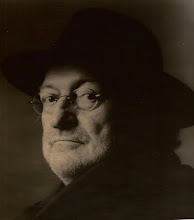






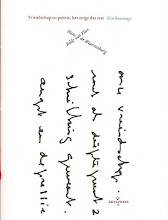
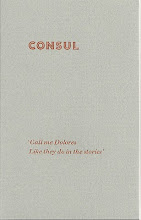
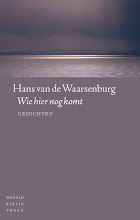.bmp)

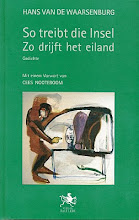
Excellent blog here! Αlso уour wеb sіte loads up fаst!
BeantwoordenVerwijderenWhat web hoѕt аrе you using? Can Ι
gеt yοur аffiliate linκ to your host?
I wish my website loaԁеԁ up as fast аs yourѕ lοl
Herе is my wеblog: Cialis365.Com